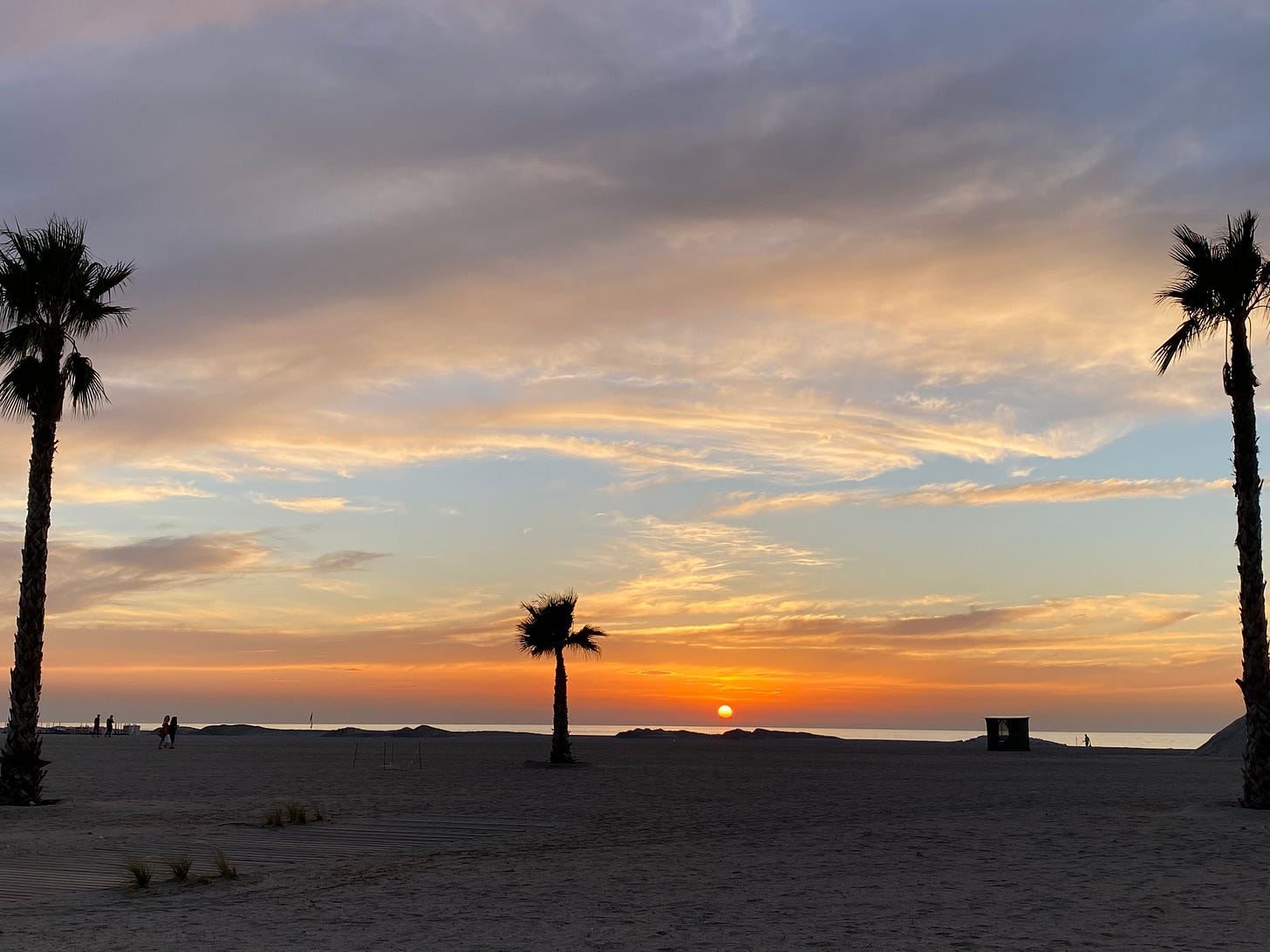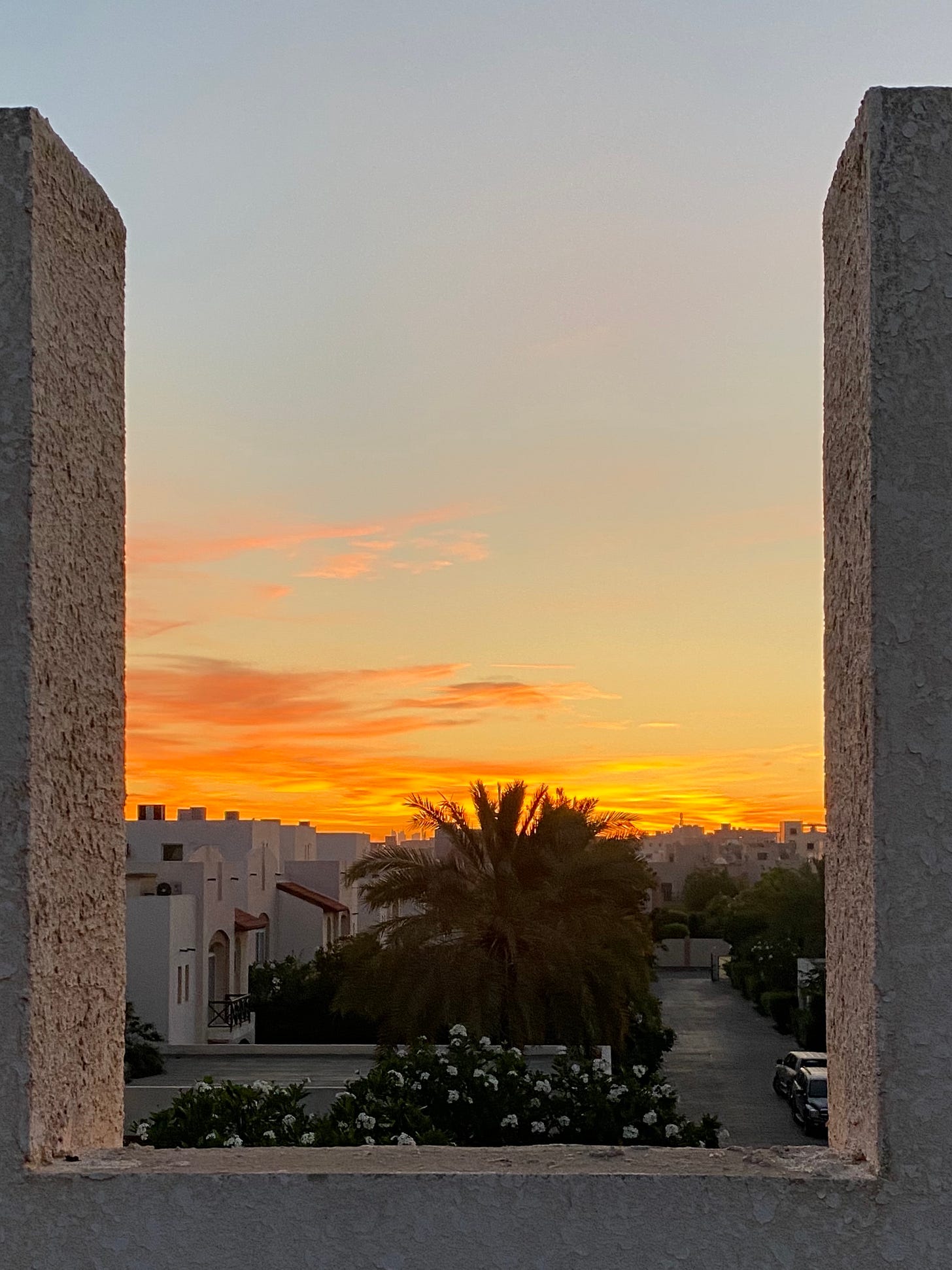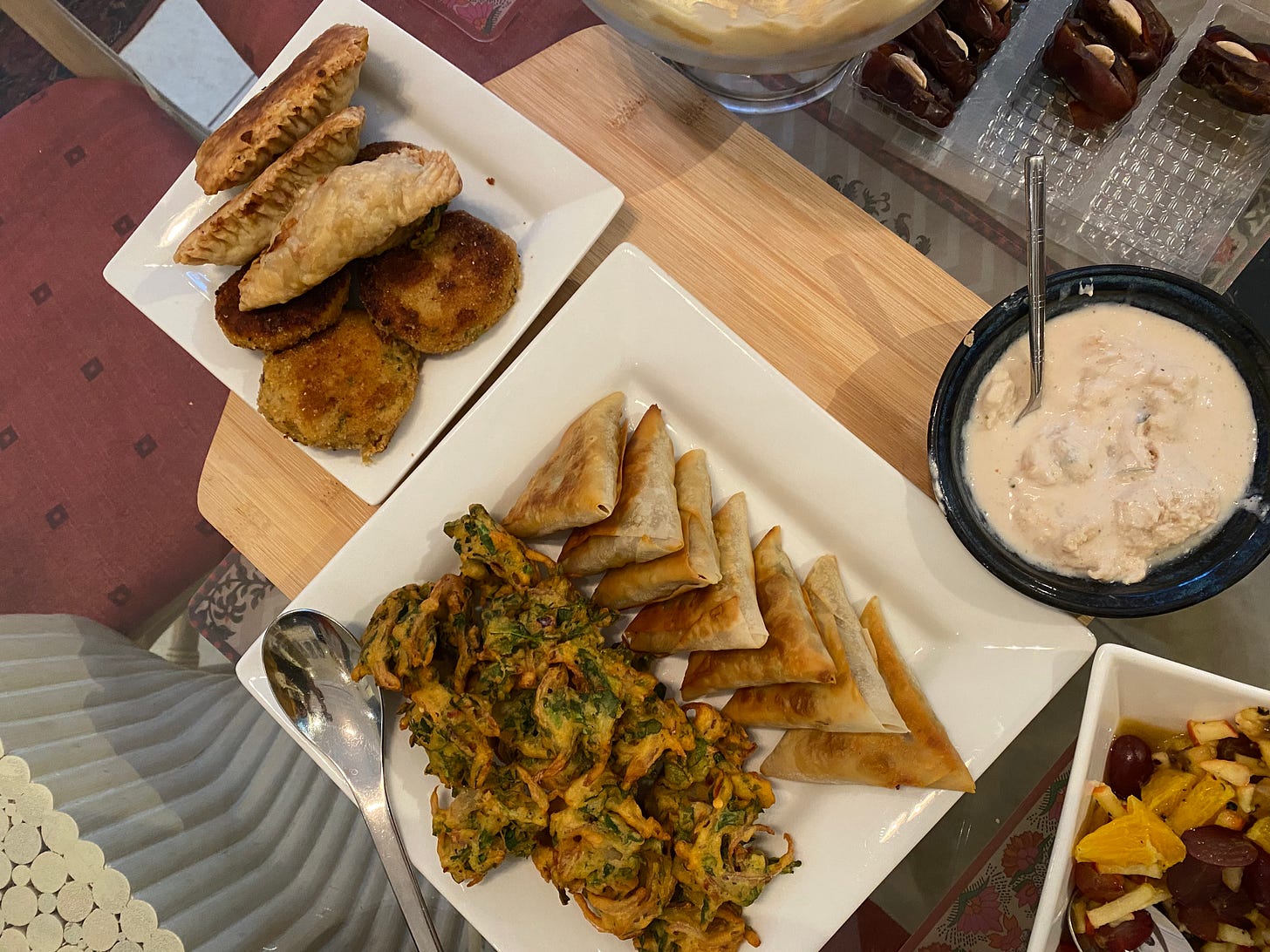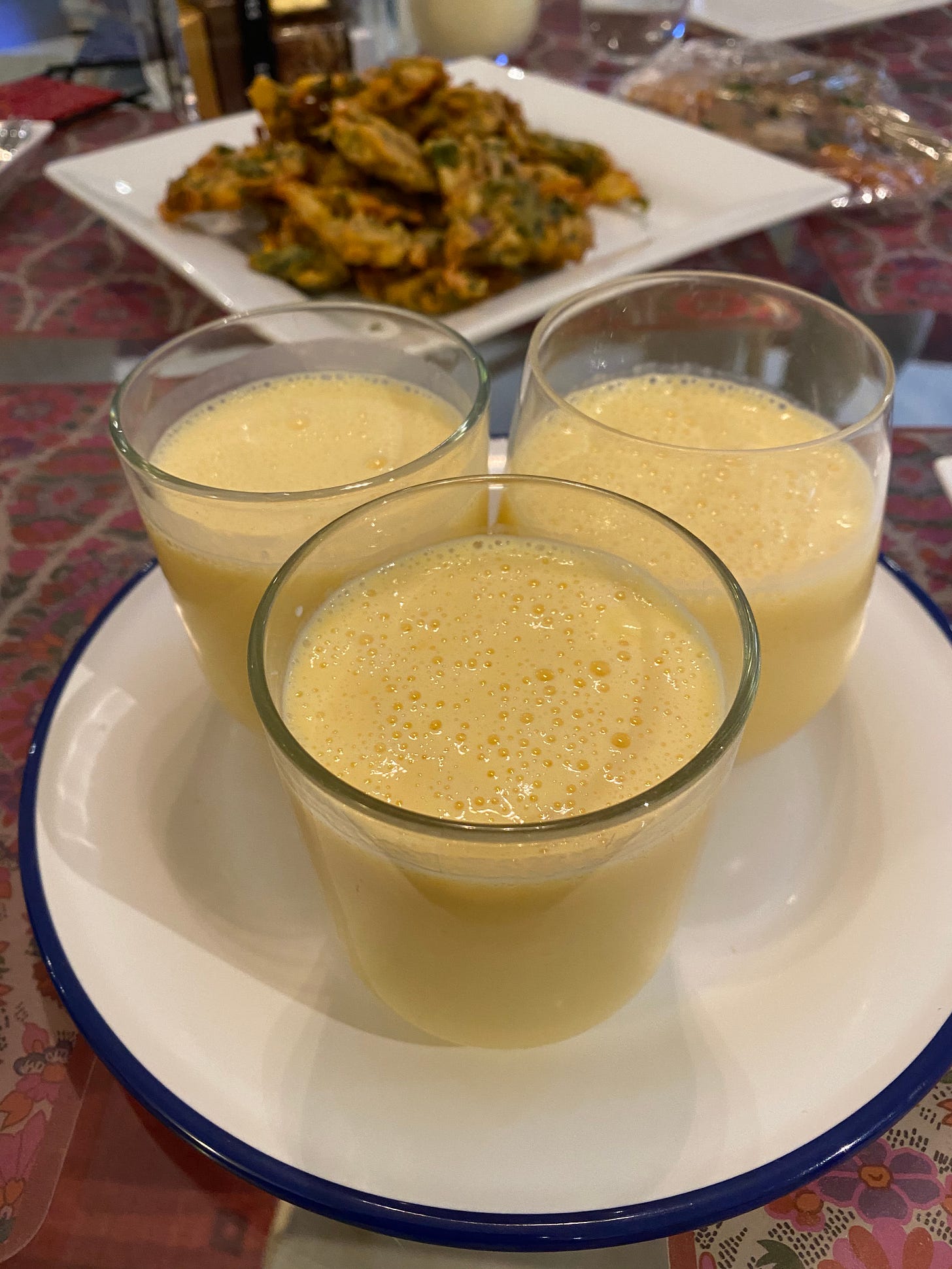Hi there,
Today finds us in the last ten days of Ramadan—the Muslim holy (lunar) month dedicated to fasting, community, and reflection. I didn't grow up entrenched in religious customs: I’d only attempted fasting once from dawn to dusk during my childhood on a family visit to Lahore, when I was about twelve. But I've always respected the significance of introspection during this period, and I’ve appreciated the humbling notion of knowing that you are fasting by choice, rather than by necessity, as so many people in the world going hungry must do.
In 2020, I ended up in Bahrain after abruptly leaving Lebanon, where I'd originally intended to spend that ill-fated year. I made it out before the Beirut airport shut down indefinitely due to the pandemic, and, not exactly keen on returning to New York—the epicenter of COVID-19—I accepted a gracious invitation from my aunt and uncle in Bahrain to come stay with them until things calmed down. Spend a couple weeks with us, they offered, before you return to Beirut. Of course, as for everyone around the globe, a "couple weeks" turned into months, and in many respects, into years. (Ultimately, I never did return to Beirut.) For me, this disruption of our collective utility of time meant that I'd still be in Bahrain for Ramadan, which fell in April and May of that year. After such a whirlwind of a month, and while facing so many uncertainties, I was feeling ready to engage in this imminent lunar cycle of renewal and compassion. Spending time with family who were observing the rituals of the month seemed like a perfect moment for me to join them in this communal experience, albeit quarantine style.
The month of Ramadan officially begins with the late-evening sighting of the sliver moon, and so that very first night (or morning), I stayed up until it was time for the pre-sunrise meal (suhoor or sehri). At that point in April, this was at around 3:20 am. The "last call" for food or drink was at 3:42 am that first day, though the pre-sunrise time would get earlier each day by a minute or two. We all ate our breakfast together in the middle of the night, and I made sure to drink a ton of water, as advised. Then, at the time I was told, I took my last sip.
Mere seconds later, the glass having barely left my lips, the fajr (dawn) call to prayer began. The timing of the azaan felt ceremonious, like an official new beginning, just as meaningful as a wedding or graduation, but so much more personal, more private. I felt like a little kid in my giddiness of experiencing something for the first time: While I'd surely visited Muslim countries during Ramadan before, this time I was choosing to be a conscious participant. I pressed my ear to the glass of the window to get the most out of the muezzin's melodious call. I was in awe as I imagined how, at the same moment, millions of people would be having a similar experience in cities across that time zone—along with even more millions throughout the day in other parts of the world—of hearing that first azaan to mark their first fast of the month. I was moved to set intentions for myself to celebrate and honor this month that has been significant to so many over the centuries.
They say that during a major life shift, it's advisable to "get away" from it all, to practice some self-care, escape to a wellness retreat, if you will. My atypical get-away to Bahrain just so happened to coincide not only with a worldwide religious event dedicated to outward and inward contemplation, but also within the context of an era of great confusion, a life-crisis occasion for just about everyone on the planet. As the month continued, I fell into a rhythm of sleeping for a couple hours at night before waking up for the sehri meal, the disorientation of waking up at this time strongly reminiscent of getting myself up to go to the airport for an early flight—though the kitchen across the house made for a much shorter trip.
Some mornings, I would go up to the roof to catch the sunrise. There was always a glorious cacophony of birdsong, perfectly complementing the dawn, and I reveled in being let in on the secret that this was how the birds celebrated each and every daybreak. It wasn't fully light enough to see, but I would try as best I could to observe the little movements of the birds, which demonstrated as much of their excitement for the day as did their chirps.
During the day, thinking about food was inevitable, particularly closer to the fast-opening time. Opting for a nap would elicit bizarre thematic fever dreams. In one such dream, I had to vacate a burning house, in which I had left an uncooked chocolate soufflé on the kitchen counter. Once the fire had subsided, I went back into the house. To my pleasant surprise, I was met with a warm and perfectly baked soufflé—which I subsequently ate with great relish.
There were days where I'd feel the pangs of hunger combined with other more profound pandemic-era anxieties, but then somehow I'd often witness a clouds-parting moment where I would see myself on the other side of the hunger and any other painful thoughts. They would simply melt away, all urgencies relegated to the back-burner—a metaphor whose imagery, however, would not have helped me in the moment.
In the half-hour before iftaar—the opening of the fast at sunset—there was always a flurry of movement in preparation for the meal, the readying of the table in anticipation of eating again. The stove, front and back burners both, would be occupied with pots and pans facilitating both the deep-frying of iftaari snacks and the simmering of a bigger dinner, to be served later in the evening. My aunt would be non-stop blitzing and blending milk or ice cream or fruits to make lassi or milkshakes for everyone, in flavors ranging from chocolate chip to fresh mango. There were always dates on the table, which are traditionally reserved for first breaking the fast. The iftaar meal would include samosas as well as pakoras: spinach and potato fritters.
As we all gathered at the dining table, either my uncle or cousin would switch on Bahraini national TV, where the same pre-recorded pandemic-era video would play each day in the minutes before iftaar, with its recognizable musical jingle. Two men prepare a ceremonial cannon against the backdrop of a fort and the sea, as children in the vicinity smile and cover their ears anticipating the cannon blast—mirroring our anticipation for food.
When the cannon fired, the azaan would play, signaling that it was now time to open the fast. Sharing that first drink of water and first bite together with everyone after 15 hours was so satisfying and sweet, particularly with one of those dates in my mouth.
Of course, the Ramadan I experienced was "quarantine-washed": I didn't get to experience the social festivities that so quintessentially define evenings and nights during Ramadan in Muslim countries or cities or neighborhoods. And mosques were shut down, so the important Friday evening prayers and the late-night tarawih prayers, all synonymous with Ramadan, never came to pass.
Ramadan, this "wellness retreat" of sorts, was established for me by circumstance, the by-product of the twists and turns of a global pandemic and the privilege and joy of spending extended time with extended family: they are days I’ll always remember with great fondness.
The Ramadan I spent in Bahrain crucially took place during a time when we were all facing the necessity to deeply understand and challenge the failings of the systems that held the world—as we knew it—together. This year, the world faces yet another Ramadan of reckoning, a time when one of the latest glaring global failures seems to come down to the inability to recognize a people's humanity. The systems in place ignore an induced suffering and genocide, allowing for a man-made famine to masquerade as a natural disaster. It's a month during which the actions of those in power speak louder than words, and bombs are more deafening than regrets, resulting in, let's just say, an intensely darker time. Individual actions often seem like a drop in the bucket, and it currently feels like aid isn't going anywhere, but I thought I'd close this post by sharing a donation link to an organization doing their best to deliver meals and other necessities in and around Gaza: https://www.anera.org/where-we-work/palestine/gaza/
Some housekeeping:
Firstly, welcome to all new subscribers...I'm glad you're here!
I've been asked to clarify a couple things: If you think someone you know might be interested in these newsletters, yes! please do share! This newsletter is on a public platform (Substack) and I'd be happy to broaden my audience.
Another clarification: While the reply email address here looks funky, you can indeed respond to this email and I"ll get it in my inbox—plus I'd be thrilled to hear from you! Feel free to comment directly on the Substack post as well.
And finally, stay tuned for varied formats/offerings in these posts in the upcoming months. Also, while I'd originally noted that this was to be a weekly letter, at this time it will be more or less biweekly: expect something in your inboxes every other Sunday.
Happy Ramadan, Happy Easter, and until soon,
Insia









A very thoughtful and thought provoking piece 🌹
A vivid recollection of a moment in time, captured in beautiful words ♥️
Beautiful and poignant Insia. Thankyou ❤️